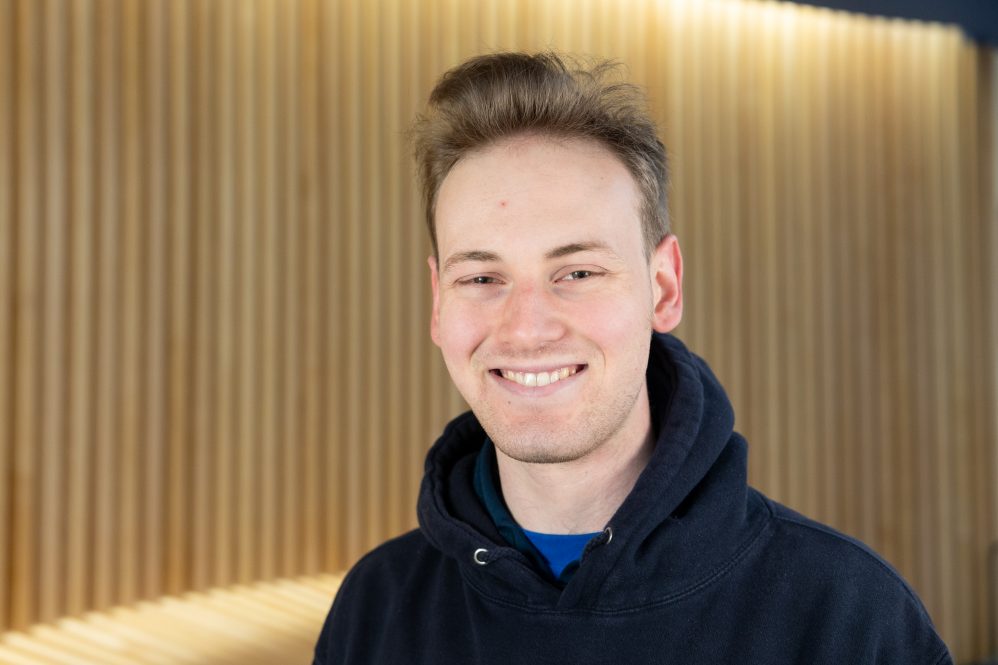Attending UConn is a family tradition for Jacob Crow, as is engineering. Crow particularly enjoyed the small collegial environment of chemical engineering, where he worked with graduate student Laron Burrows to win an Accelerate UConn Propelus grant on a cheaper, safer way to produce ammonia for industry. He also participated in engineering societies and the Quantum Computing club. One of the few things at UConn he couldn’t re-engineer was the weather, but he’ll be escaping that next year as he moves to balmy North Carolina to pursue a Ph.D.—and perhaps enjoy a little more college basketball.
Why did you choose UConn?
My grandmother, great aunt, parents, uncle, and older siblings are all UConn undergrad alums, and my brother also went to UConn Law. Being a Husky runs in the family for sure.
What’s your major or field of study, and what drew you to it?
I am a chemical engineering major. I liked the idea of working in applied sciences. I think that it is easier to make a tangible impact on society in engineering as opposed to chemistry or physics. Those hard sciences generally have more esoteric impacts on the public.
Did you have a favorite professor or class?
I thought Dr. Stuber, who teaches Numerical Analysis, was the best lecturer/professor I had. My favorite courses were Organic Chemistry II with Dr. Gilmore and Physical Chemistry II with Dr. Gascon.
What activities were you involved in as a student?
A few professional development organizations, such as the UConn Chapter of the American Institute of Chemical Engineers (AiChE), the International Society of Pharmaceutical Engineers (ISPE), & Tau Beta Pi (Engineering Honor Society). I also participated in the Badminton, Chess, and Quantum Computing Clubs.
What’s one thing that surprised you about UConn?
The weather. I grew up in Orange, Connecticut, so I knew the state was cold, but Storrs is especially so. My sophomore spring there was a Friday into Saturday where it was minus 5 degrees Fahrenheit. The wind tunnels on campus are pretty crazy.
What are your plans after graduation/receiving your degree?
After graduating I’m going to Duke University to pursue a Ph.D. in mechanical engineering & materials science starting this fall. I will join Dr. Miaofang Chi’s research group which specializes in electron microscopy, a high-resolution imaging technique that takes you down to the atomic scale. This allows you to characterize materials by understanding what atoms exist in them. Dr. Chi is also a corporate fellow at the Oak Ridge National Lab, and I’m very excited to work with her and join the Blue Devil family.
How has UConn prepared you for the next chapter in life?
The ChemE department at UConn does a great job of supporting students with their goals after graduation. It is a smaller department which encourages a fraternal environment between faculty and students. In particular, Dr. Pascal, Dr. Wagstrom, and Dr. Cho have been incredibly supportive of me with my decision to pursue a Ph.D. and have helped other students with both industry and academic career goals.
Any advice for incoming students?
The resources are there for success, but you have to seek them. As young adults, the onus is now on you to decide the direction of your life. People invest in those worthy of investment; if you show a willingness to learn and improve, you will build a network of support that can get you to your goals. Obviously enjoying the other aspects of college are a part of it, but you’re paying a lot of money for your education so that should be the main emphasis.
What’s one thing everyone should do during their time at UConn?
The easy answer is basketball – it’s rare for a school to have excellent men’s and women’s basketball programs. My four years have seen the men win twice, the women win once and make the finals the other time. Beyond that, there are hundreds of activities and clubs to join that don’t exist at smaller institutions.
What will always make you think of UConn?
Family. As stated before, all of us being UConn alumni means it’s always a topic of conversation.



